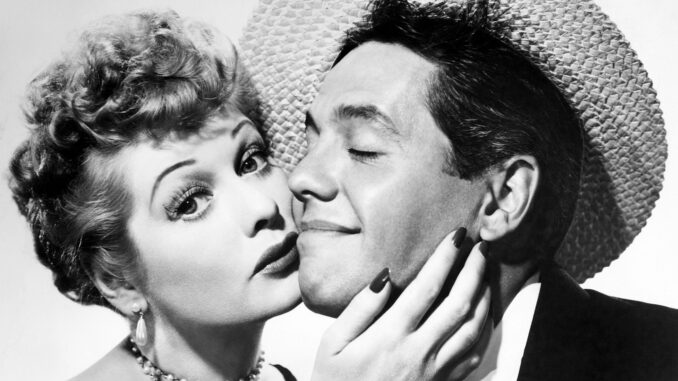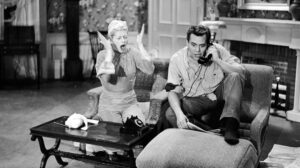
Introduction: The Icon Behind the Curtain
Lucille Ball wasn’t just an actress; she was a trailblazer, a comedian, and a powerhouse who redefined television. When Being the Ricardos hit screens, fans eagerly anticipated a heartfelt tribute to her legacy. Instead, they got a film that glossed over her true story, leaving fans and critics questioning its accuracy. Let’s dive deep into how Being the Ricardos overlooked Lucille Ball’s real-life brilliance and the events that made her an icon.
H1: Lucille Ball: A Pioneer in Comedy and Television
H2: Breaking Barriers in a Male-Dominated Industry
Lucille Ball shattered glass ceilings long before it was trendy. She wasn’t just an actress but the first woman to head a major production studio, Desilu Productions. Her influence extended beyond comedy, shaping how TV shows were produced and distributed.
H3: The Creation of I Love Lucy
Lucille Ball and Desi Arnaz created I Love Lucy, a show that revolutionized sitcoms. From multi-camera filming to live audience laughter, they pioneered techniques still used today.
H4: The Woman Behind the Laughter
While her comedic timing made millions laugh, Ball was also a savvy businesswoman. Her decisions influenced the entertainment industry in ways Being the Ricardos barely scratched.
H1: What Being the Ricardos Got Right
H2: Stellar Performances by Nicole Kidman and Javier Bardem
Nicole Kidman delivered a nuanced portrayal of Ball’s professional grit, and Javier Bardem captured Desi Arnaz’s charm. Their chemistry reflected the complicated dynamics of Lucille and Desi’s relationship.
H3: Highlighting Career Challenges
The film addressed Lucille’s brief brush with accusations of communism, an important chapter in her life. It also touched on the behind-the-scenes pressure of creating I Love Lucy.

H1: Where Being the Ricardos Fell Short
H2: Oversimplifying Lucille Ball’s Legacy
The film reduced Ball’s incredible achievements to a series of dramatic highlights. Her revolutionary contributions to TV production were barely mentioned, leaving viewers with an incomplete picture of her impact.
H3: Ignoring Key Relationships
Ball’s relationships with her co-stars, such as Vivian Vance and William Frawley, were pivotal to I Love Lucy. Being the Ricardos sidelined these dynamics, focusing solely on her marriage to Desi.
H4: Romanticizing Desi Arnaz
The film downplayed Arnaz’s infidelity and the emotional toll it took on Ball. Their marriage, while groundbreaking, was far more complicated than what was shown.
H1: The True Story Behind the Headlines
H2: The Communist Allegations
While Being the Ricardos mentioned Ball’s communist accusations, it failed to convey the gravity of the situation. Ball’s brave testimony before the HUAC cleared her name and showcased her resilience.
H3: Desilu Productions: A Forgotten Legacy
Desilu Productions, co-founded by Ball and Arnaz, was responsible for hits like Star Trek and The Andy Griffith Show. The movie glossed over Ball’s role in transforming the studio into a powerhouse.
H4: The Real Struggles of a Comedy Queen
Ball didn’t just wake up famous. She faced years of rejection and clawed her way to the top through sheer determination—a journey the film oversimplified.
H1: Why Accuracy Matters in Biopics
H2: A Legacy Worth Preserving
Lucille Ball’s life is a blueprint for aspiring entertainers and entrepreneurs. Misrepresenting her story diminishes her contributions and cheats audiences out of an authentic narrative.
H3: Fans Expect the Truth
When fans tune into a biopic, they expect more than entertainment—they want a window into their hero’s life. Failing to deliver authenticity feels like a betrayal to Ball’s enduring fanbase.
H1: How Hollywood Can Learn from This
H2: Balancing Drama and Reality
Biopics often sacrifice facts for dramatic flair, but it’s possible to strike a balance. Films like Bohemian Rhapsody and Hidden Figures have shown that true stories can be both accurate and engaging.
H3: Listening to Fans and Historians
Involving those who knew Lucille Ball or have studied her life would have ensured a more faithful representation. Hollywood needs to value accuracy as much as entertainment.
H1: Conclusion: Lucille Ball Deserved Better
Lucille Ball’s life was a story of grit, genius, and groundbreaking achievements. While Being the Ricardos captured glimpses of her struggles, it missed the heart of her journey. The real Lucille Ball wasn’t just a character in a drama—she was the writer of her own success story. If there’s one thing we can learn, it’s that her legacy deserves to be told with honesty and reverence.
FAQs
Q1: Was Being the Ricardos based on a true story?
Yes, the film was based on real events but took significant creative liberties, often oversimplifying or omitting important aspects of Lucille Ball’s life.
Q2: Did Lucille Ball approve of any past biopics?
Lucille Ball passed away in 1989, so she had no say in Being the Ricardos. However, earlier portrayals were often endorsed by her estate.
Q3: What was Lucille Ball’s biggest achievement?
Apart from I Love Lucy, her greatest achievement was co-founding Desilu Productions, which changed the face of television production.
Q4: How accurate was Nicole Kidman’s portrayal?
While Kidman delivered a strong performance, her portrayal focused more on Ball’s professional challenges than her multifaceted life.
Q5: Will there be another biopic about Lucille Ball?
There’s no confirmation, but fans continue to hope for a more comprehensive and authentic portrayal of the comedy legend.